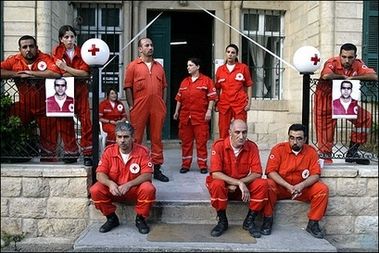 Michael Winfrey BEIRUT, Aug 13 (Reuters) – Relief agencies sent convoys towards southern Lebanon on Sunday, hoping a planned truce between Israel and Hizbollah guerrillas would mean rapid improvement in the humanitarian crisis there. Frustrated by heavy fighting and a ban on movement imposed by Israel’s army, aid workers say they have been unable to bring food, water and medicine to an estimated 100,000 people trapped south of Lebanon’s Litani River. But they said they could reach the area on short notice if a truce resulting from last week’s U.N. Security Council resolution to end the war takes place on Monday as planned.
Michael Winfrey BEIRUT, Aug 13 (Reuters) – Relief agencies sent convoys towards southern Lebanon on Sunday, hoping a planned truce between Israel and Hizbollah guerrillas would mean rapid improvement in the humanitarian crisis there. Frustrated by heavy fighting and a ban on movement imposed by Israel’s army, aid workers say they have been unable to bring food, water and medicine to an estimated 100,000 people trapped south of Lebanon’s Litani River. But they said they could reach the area on short notice if a truce resulting from last week’s U.N. Security Council resolution to end the war takes place on Monday as planned.
We’re hoping that by the time our trucks reach the Litani, a crossing will be secured," he said. The WFP said another convoy was halted on the Syrian border due to Israeli air strikes, but said it had received clearance for two ships to dock in Beirut with fuel, food, and other supplies for the estimated 900,000 people displaced by the war. At least 1,076 people in Lebanon, mostly civilians, and 144 Israelis, including 104 soldiers, have died in the month-long war, triggered when Hizbollah seized two soldiers in a raid into the Jewish state on July 12. FUEL CRISIS EASING A senior source at Beirut’s airport said one of three destroyed runways could be fixed within a week once work could begin. The strips can now accommodate only planes needing short landing distances. Tyre and Sidon were still without electricity after Israel bombed power stations there on Friday, but a fuel crisis that had threatened to shut down water pumping stations and hospitals was easing. A senior source in the fuel industry said five million litres of petrol had arrived last week from Syria and another similar shipment was expected next week. A ship carrying 30,000 tonnes of fuel could also arrive in Beirut as early as Monday. "If the naval blockade is lifted tomorrow morning and there is a cessation of hostilities, it will come in," he said. "If that happens, we would have immediate relief and things should quickly return to normal." The UNHCR refugee agency said as many as a third of the displaced could return within days of a truce, although aid groups said refugees would remain very cautious. "When the people feel secure, they’ll go back," said Cassandra Nelson, senior communications officer for aid group Mercy Corps. "But at this point it’s very unclear what the situation is for security or safety, as it has been for this entire war."



